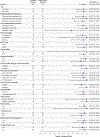KTE-X19 CAR T-Cell Therapy in Relapsed or Refractory Mantle-Cell Lymphoma
- PMID: 32242358
- PMCID: PMC7731441
- DOI: 10.1056/NEJMoa1914347
KTE-X19 CAR T-Cell Therapy in Relapsed or Refractory Mantle-Cell Lymphoma
Abstract
Background: Patients with relapsed or refractory mantle-cell lymphoma who have disease progression during or after the receipt of Bruton's tyrosine kinase (BTK) inhibitor therapy have a poor prognosis. KTE-X19, an anti-CD19 chimeric antigen receptor (CAR) T-cell therapy, may have benefit in patients with relapsed or refractory mantle-cell lymphoma.
Methods: In a multicenter, phase 2 trial, we evaluated KTE-X19 in patients with relapsed or refractory mantle-cell lymphoma. Patients had disease that had relapsed or was refractory after the receipt of up to five previous therapies; all patients had to have received BTK inhibitor therapy previously. Patients underwent leukapheresis and optional bridging therapy, followed by conditioning chemotherapy and a single infusion of KTE-X19 at a dose of 2×106 CAR T cells per kilogram of body weight. The primary end point was the percentage of patients with an objective response (complete or partial response) as assessed by an independent radiologic review committee according to the Lugano classification. Per the protocol, the primary efficacy analysis was to be conducted after 60 patients had been treated and followed for 7 months.
Results: A total of 74 patients were enrolled. KTE-X19 was manufactured for 71 patients and administered to 68. The primary efficacy analysis showed that 93% (95% confidence interval [CI], 84 to 98) of the 60 patients in the primary efficacy analysis had an objective response; 67% (95% CI, 53 to 78) had a complete response. In an intention-to-treat analysis involving all 74 patients, 85% had an objective response; 59% had a complete response. At a median follow-up of 12.3 months (range, 7.0 to 32.3), 57% of the 60 patients in the primary efficacy analysis were in remission. At 12 months, the estimated progression-free survival and overall survival were 61% and 83%, respectively. Common adverse events of grade 3 or higher were cytopenias (in 94% of the patients) and infections (in 32%). Grade 3 or higher cytokine release syndrome and neurologic events occurred in 15% and 31% of patients, respectively; none were fatal. Two grade 5 infectious adverse events occurred.
Conclusions: KTE-X19 induced durable remissions in a majority of patients with relapsed or refractory mantle-cell lymphoma. The therapy led to serious and life-threatening toxic effects that were consistent with those reported with other CAR T-cell therapies. (Funded by Kite, a Gilead company; ZUMA-2 ClinicalTrials.gov number, NCT02601313.).
Copyright © 2020 Massachusetts Medical Society.
Figures


Comment in
-
CAR T-cell therapy for relapsed or refractory mantle-cell lymphoma.Lancet Oncol. 2020 May;21(5):e239. doi: 10.1016/S1470-2045(20)30231-X. Epub 2020 Apr 9. Lancet Oncol. 2020. PMID: 32278358 No abstract available.
-
Chimeric antigen receptor (CAR) T-cells on the march: from diffuse large B-cell lymphoma to mantle cell lymphoma.Eur J Cancer. 2020 May;131:51-52. doi: 10.1016/j.ejca.2020.03.001. Epub 2020 Apr 10. Eur J Cancer. 2020. PMID: 32283478 No abstract available.
-
KTE-X19 active in MCL.Nat Rev Clin Oncol. 2020 Jun;17(6):336. doi: 10.1038/s41571-020-0373-3. Nat Rev Clin Oncol. 2020. PMID: 32317773 No abstract available.
-
CAR T Cells for Mantle Cell Lymphoma: Is it Time to Reshuffle the Deck?Cancer Cell. 2020 Jun 8;37(6):761-763. doi: 10.1016/j.ccell.2020.05.015. Cancer Cell. 2020. PMID: 32516587
References
-
- Teras LR, DeSantis CE, Cerhan JR, Morton LM, Jemal A, Flowers CR. 2016 US lymphoid malignancy statistics by World Health Organization subtypes. CA Cancer J Clin 2016;66:443–59. - PubMed
-
- Cheah CY, Seymour JF, Wang ML. Mantle cell lymphoma. J Clin Oncol 2016;34:1256–69. - PubMed
-
- Martin P, Maddocks K, Leonard JP, et al. Postibrutinib outcomes in patients with mantle cell lymphoma. Blood 2016;127:1559–63. - PubMed
Publication types
MeSH terms
Substances
Associated data
Grants and funding
LinkOut - more resources
Full Text Sources
Other Literature Sources
Medical
